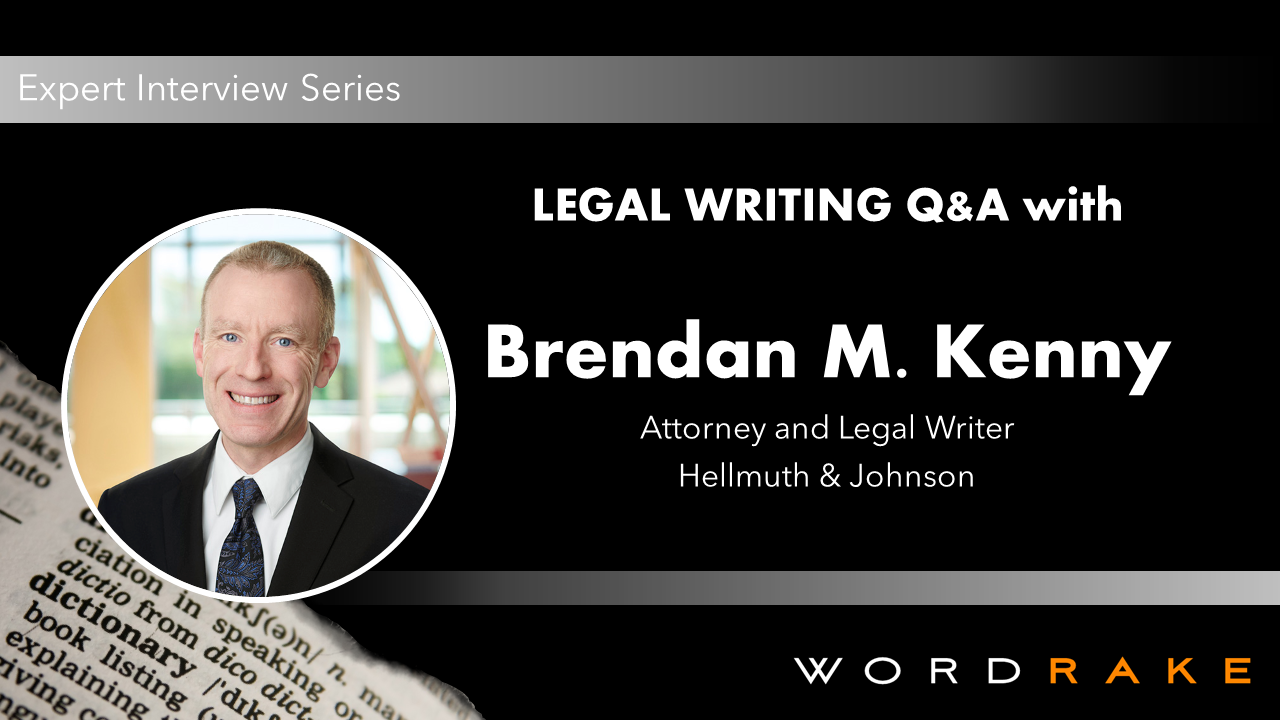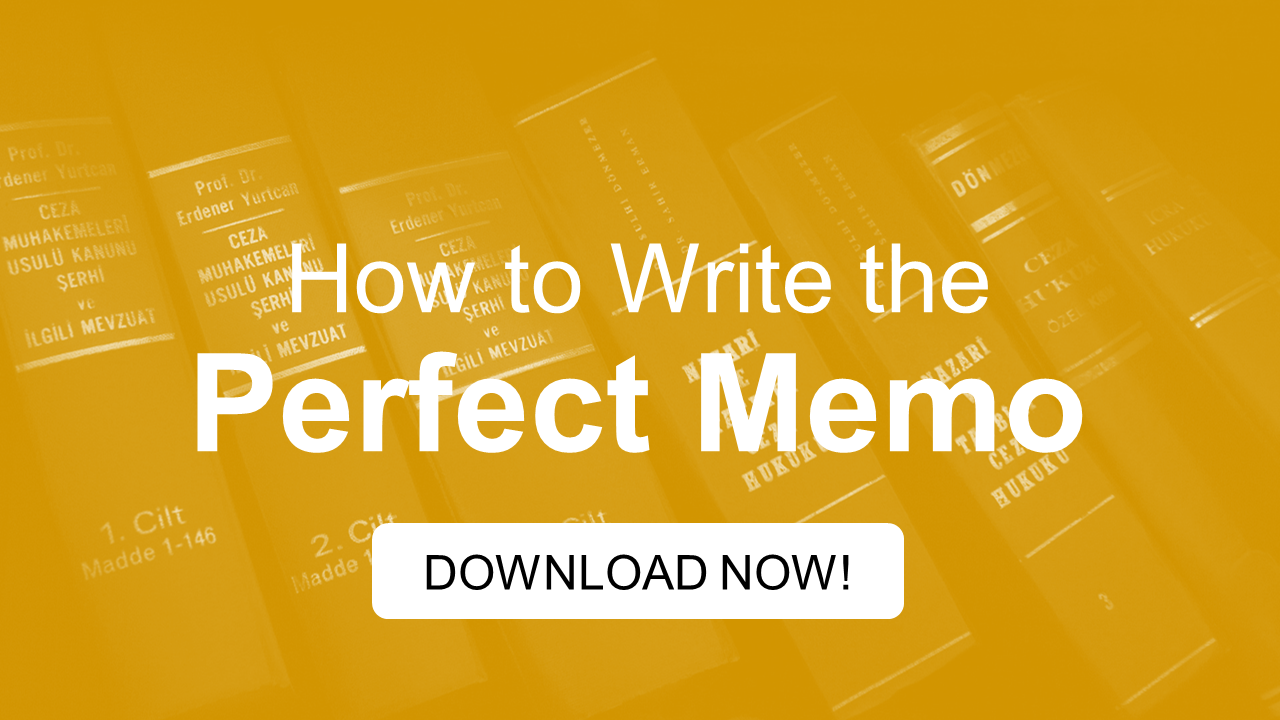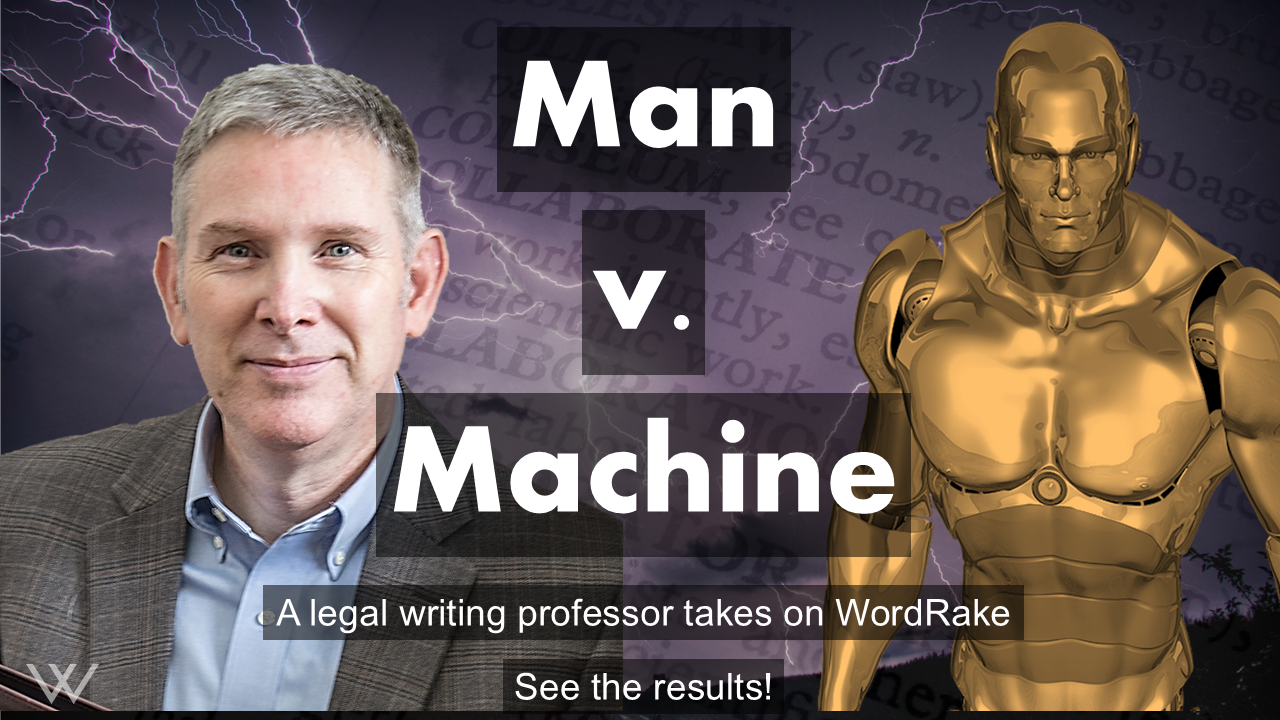Does your firm have a dedicated legal writing team? If you have the resources, it might be worth considering! Brendan M. Kenny from Hellmuth & Johnson works as a litigator himself, and as a legal writer for other members of the practice. This gives him and his colleagues in the legal writing group the opportunity to explore and perfect the use of new technologies to support their writing. He shared his experience with us in this expert interview:
What are the top 3 to 5 characteristics of good legal writing?
Good legal writing is rooted in clarity, conciseness, organization, and an awareness of your audience. Clarity removes unnecessary hurdles to reader comprehension, and concise writing respects the reader's time and focuses only on essential information. A well-organized structure guides the reader, allowing them to follow complex arguments and nuances logically. And knowing the audience—whether judge, opposing counsel, or client—is crucial. This dictates tone, word choice, and even format. Finally, plain language enhances accessibility and helps bridge the gap between legal jargon and real-world language, transforming a confusing and bloated argument into one that resonates with the reader.
Why is good writing important to being a good lawyer?
For most of us, good writing is our most vital tool for advocacy. It’s essential because writing is typically your primary way to reach the judge, opposing counsel, or your client. If the writing is weak, even strong legal arguments may be dismissed or misunderstood. Effective legal writing demonstrates respect for the reader by presenting arguments that are direct, organized, and persuasive. In short, strong writing makes otherwise forgettable arguments memorable.
What is the most frustrating part about becoming a good legal writer? How do you overcome it?
“In law, nothing is certain but the expense.” (Unknown). And “everything is an experiment until it has a deadline.” (Brian Eno). So in my experience, the underlying challenges in all legal writing are (1) doing the best job (2) on the available budget (3) by the deadline. A major tool I use is the Flowers Paradigm (popularized among legal writers by Bryan Garner), which breaks down the writing process into brainstorming, organizing, drafting, and editing stages. Approaching each stage without shortcuts helps make the final product focused, polished, and persuasive. This disciplined approach helps me meet all three challenges.
Do you view writing as a product or a process? How do you define that? What difference does it make?
Legal writing is a process. From conceptualizing arguments to finalizing drafts, writing involves multiple stages that each add value to the final product. Viewing writing as a process emphasizes the need for diligence and revision, allowing each draft to evolve and improve. This perspective also encourages patience, since effective legal writing seldom emerges perfectly in the first draft. When writing is treated as a process, the end product is stronger and more persuasive because it has undergone refinement at each stage.
Some say that legal writing doesn’t improve because lawyers are devoted to re-using archaic language from form documents or caselaw. Do you believe that’s true? What advice do you have for updating and improving language?
There’s some truth to this critique. Lawyers often use archaic language, thinking it preserves legal accuracy or formality. But sticking to outdated language obstructs clear communication. Modernizing legal writing begins with adopting plain language—choosing words that communicate clearly without diluting legal meaning. Strong verbs, active voice, and straightforward syntax all contribute to effective writing. Whenever possible, I try to revise standard forms to reflect plain language principles. Updating these forms sparks conversation (and sometimes controversy) with other lawyers and legal support, and plants seeds for others to think about updating and improving how they write.
What unique insights do great writers have about how legal work is done? About persuasion? About storytelling?
Great legal writers understand that persuasion often relies more on narrative, rather than on logic alone. Aristotle’s ethos, logos, and pathos aren’t just rhetorical devices; they’re essential for crafting arguments that resonate. A compelling legal narrative ties facts to a relatable story, making the legal issue feel relevant and urgent. It adds an emotional dimension that reinforces the ethical and factual arguments.
How can legal writers improve their ability to accept and incorporate editing feedback?
“We cannot solve our problems with the same thinking we used when we created them.” (Albert Einstein). Without feedback, it is inevitable that I will eventually get stuck, and I will stay stuck. Receiving feedback can be challenging, because I’m deeply invested in my own work. Still, feedback is crucial for growth, and “growth is the only evidence of life.” (John Henry Newman). I strive to embrace feedback by reframing it as an essential part of my writing process. I (very imperfectly) try to treat it as a tool that strengthens the final product—and more importantly, strengthens my writing process. Unless I approach feedback with humility and see it as an opportunity for growth, I won’t be able to improve. So I love and embrace all feedback, even—and especially!—when I don’t feel like loving and embracing it.
How do you use storytelling in legal writing?
Storytelling is fundamental to effective legal writing. Facts alone rarely sway decision-makers. But when those facts are woven into a story, they resonate more strongly. Persuasive legal writing transforms a list of facts into a cohesive narrative that speaks to the reader’s values and sense of justice.
What are your top 3 tips for helping legal professionals better plan their writing to meet deadlines?
-
Use a structured process: Tools like the Flowers Paradigm (Madman, Architect, Carpenter, Judge) break the task into manageable stages, avoiding last-minute panic.
-
Set realistic internal deadlines: Allow ample time to draft, revise, and proofread, and build in a buffer for unexpected delays.
-
Focus on preparation and organization: Outline key arguments, supporting facts, and case law to streamline the drafting process. This helps you avoid unnecessary edits or restructuring.
In the age of AI, is good legal writing a valuable skill? What do you expect to change?
Absolutely—good legal writing remains crucial, even as AI advances. AI tools cannot replace a human’s strategic insights and persuasive skills. AI is fast becoming a collaborative tool—improving our efficiency without diminishing the value of our uniquely human writing skills. Even with these AI advances, good legal writing will always remain good human writing. This all reminds me of something my oldest daughter (now 14) said when she had a toy taken away at 3 years old: “You can take everything away from me, but you can’t take away my imagination!”
What do you wish we’d asked you?
To start, I’m honored that you invited me to answer any questions at all. Still, I wish you had asked me, “How do you ensure your writing remains persuasive and accessible over time?” As legal writing standards evolve, I have to continually refine my skills to maintain clarity and persuasiveness. Unless I keep up-to-date with writing trends and embrace new digital tools to produce accessible and powerful writing in a changing legal landscape, I won’t remain on a growth trajectory—and my writing will stagnate.
How do you think about AI and Legal Writing? Is there an ethical way for legal writers to use AI in their practice?
AI has tremendous potential to aid legal writers by automating mundane tasks like proofreading, organizing research, and suggesting structural improvements. It’s crucial to remember that AI is a tool, not a substitute for a human writer. Lawyers should use AI to enhance clarity and streamline workflow while ensuring that human judgment guides the final draft. My colleague Neven Selimovic and I wrote an article about this in the October issue of the Bench & Bar magazine. You can read the full article here.
About Brendan Kenny
Brendan M. Kenny is a member of Hellmuth & Johnson’s Appellate & Legal Writing Practice Group. He is known for his exceptional writing skills, leveraging technology to streamline law practice, and making complex legal concepts accessible to clients and courts. He is a sought-after speaker on legal writing, technology, and persuasion.
About the Legal Writing Interview Series
WordRake founder Gary Kinder created the software to help legal writers edit for brevity and simplicity. In continued dedication to the most effective legal writing, this Series highlights the experience and advice of experts from professors to writing coaches to litigators. Looking to help boost your legal writing skills? Get a free 1-week trial of WordRake here.









